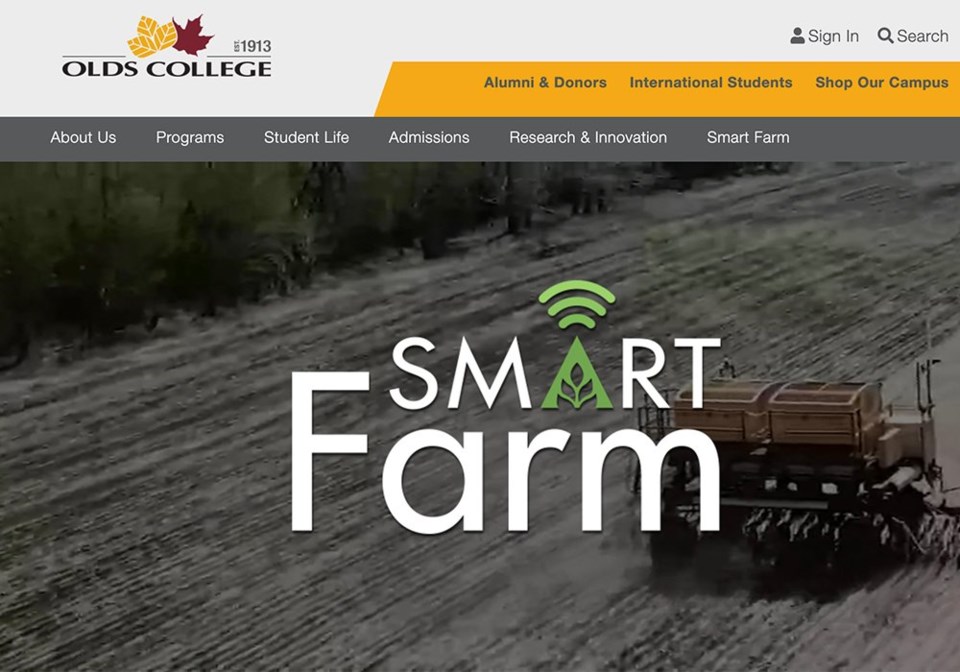CRAIK, Sask. — Olds College’s Smart Farm operation is expanding into Saskatchewan.
The school has been gifted 800 acres of land near Craik, Sask., by Margery Steckler and her late husband, George Steckler. The couple also donated their 320-acre home farm west of Didsbury, Alta., two years ago.
“With the addition of the Saskatchewan Smart Farm, we now have 3,600 acres of land,” said Patrick Machacek, Olds College vice-president of development and strategy.
He said the expansion into Saskatchewan will serve the school’s four-year-old Smart Farm by providing a larger platform to collaborate with local producers, post-secondary institutions and industry partners.
“There’s been a huge area of interest in ag technology and smart ag,” he said.
Initial partners include Saskatchewan Polytechnic, Raven Industries, Carlson Agriculture and Wildfong Enterprises.
“We’re really excited to have boots on the ground right there, both in terms of operations but also to support our applied research and learning activities that will take place on the Smart Farm,” he said.
Launched in 2018, Olds College Smart Farm is focused on five areas of applied research: autonomous agricultural equipment, sensors, data utilization, technology development and validation, and regenerative agriculture.
The platform also provides producers with in-field applied research to help them make informed decisions about implementing technology in their operations.
“Producers were saying that the data issue was the biggest one for them because they were starting to get mounds of data and struggling with good utilization of the data,” said Machacek.
“We recognized that we needed to place the college in the future of ag so that the students coming out of the institution really had exposure to both digital agriculture and technology utilization and adaptation going forward.”
A key principle is to ensure the Smart Farm represents a commercial operation as much as possible.
“Whether it’s the producers that we engage with or the industry partners that are looking to engage us to do applied research projects, that’s one of the pieces that they’re incredibly impressed with and need,” said Machacek.
Since inception, he said the Smart Farm platform has grown quickly with more than $50 million invested through donations, sponsorships and grants from government, industry and the private sector.
“A big part of the Smart Farm is the talent and expertise that we’ve accumulated at Olds College, both in terms of our researchers, technicians and also our faculty who are providing a cutting-edge learning environment for students, producers, and the agriculture sector,” he said.
“So, there’s a huge amount that’s centred around the Smart Farm that impacts our student learning environment, but then also impacts our applied research environment as well.”
Machacek said Olds College won’t deliver programs in Saskatchewan but will support institutions that already do, primarily Saskatchewan Polytechnic and the University of Saskatchewan.
“We’re going to be inviting them to work with us to use the Smart Farm to enhance their learning environments, whether it’s through integration of data or technology.”
Research on autonomous agriculture will continue.
“We’ll be doing the soil sensors, the weather sensors, the full array of technology will be put on the land to gather data,” he said.
Another research project involves the hyperlayer data concept, which allows the Smart Farm to collect, analyze and use all types of agricultural data. It centres around compiling topographical data, detailed soil nutrient and moisture mapping, multispectral and hyperspectral imagery, yield data, and other information to assist in machine learning for analysis, data extraction and building next-generation analytical algorithms.
Students won’t be travelling between Olds, Alta., and Craik.
“The Saskatchewan Smart Farm will benefit the Olds students primarily through the data that’s generated off of that Smart Farm. There will also be different student interfacing opportunities, whether it’s student internships in the summertime that we’ll be looking at hiring if the students happen to be from that region.
“We anticipate that we’re going to impact students in Saskatchewan through our partnerships with Saskatchewan Polytechnic and University of Saskatchewan,” Machacek said.
The donated land will be used for crop production and possibly for livestock where the topography doesn’t support cropping.
“We’re definitely embracing land donations when they come our way. Now that we’ve established the Olds College Smart Farm, we are looking at our land footprint from the point of view of supporting students, producers and industry partners in Alberta, Saskatchewan and throughout Western Canada.”




